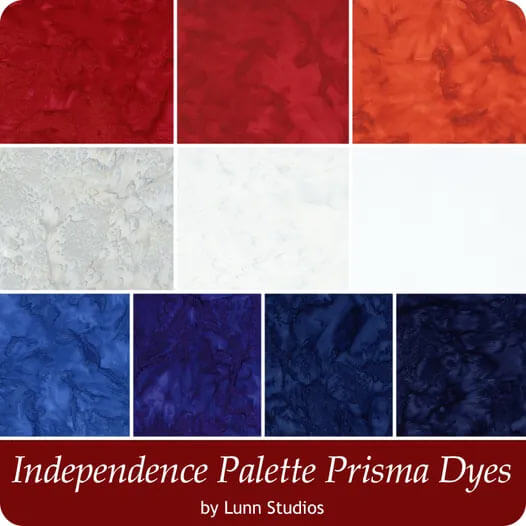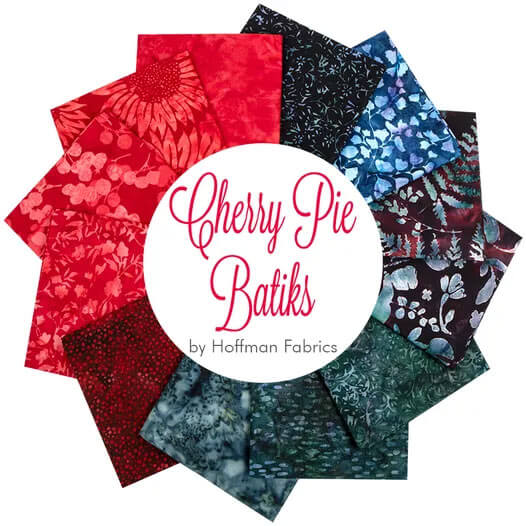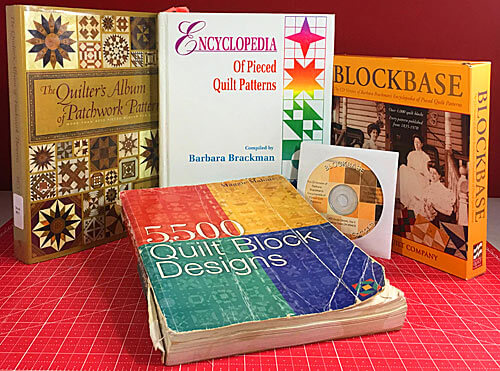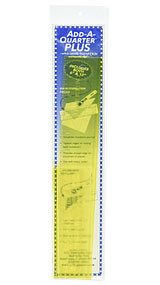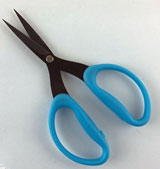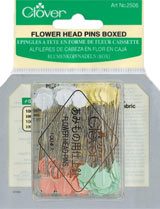- Home
- Free Quilt Block Patterns
- Sunshine Quilt Block
Sunshine Quilt Block
From our Free Quilt Block Patterns Library
This post contains affiliate links, for which I receive compensation.
Skill Level: Confident Beginner
A Sunshine quilt block is perfectly pointy with our free paperpiecing patterns to download in both 6" and 8" finished sizes.
Generously cut patches and the ability to sew on a line are the only skills needed to make this fun block.
If you're a machine embroiderer, you'll find that the center square of the 8" version is large enough for a 4" embroidery design (as long as it looks good on point).
Rise and shine, it's time to get started on our Sunshine quilt block.

📋 General Instructions
All seam allowances (SA) are 1/4".
I switch my presser feet during construction, using an open toe applique foot for paperpiecing and my favorite quarter inch foot with a guide for assembling the blocks.
And finally, heavily starched fabric makes cutting and piecing more accurate, in my humble opinion. One of the added benefits is that you can fingerpress many of the SAs instead of hopping back and forth between the iron and your sewing machine.
Step 1: Download the patterns
To download any of our free paperpiecing patterns, you MUST HAVE ADOBE READER installed on your computer. Get it here if you don't already have it.
WHY ADOBE?
It's
simple. My patterns have dashed placement guides to make the
positioning of the first patch totally foolproof. With Adobe, they
show exactly as intended—a dashed line. In other programs they render as a
solid lines which makes it confusing for a beginning
quilter.
To start, open the downloaded file, and select the "Print" option.
Under 'Page Sizing and
Handling' in the Adobe print menu, set 'Custom Scale' to 100%. Click here to see where it's at on the page.
If you use something other than Adobe, you'll need to set 'Page Scaling' to 'None' to print at '100%'. Printing at 'Actual Size' tends to print blocks at weird sizes.
Choose your finished size from the table below and print the corresponding page.
| PRINT the Sunshine Paperpiecing Patterns | ||
|---|---|---|
| Finished Block Size | # of copies to print | Link to PDF Patterns |
| 6” | 1 | 6" |
| 8” | 1 | 8" |
Use the information on the printed page to measure your block to confirm that it's the correct size.
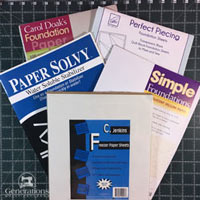
Not sure which paper to use?
Take a look at my review of several of the most popular brands available to us quilters on the market.
You want a super-easy paper to tear away—less stress on the stitches.
New quilt fabrics to tickle your fancy...
Click the images below to see the full collection. We share any commercial and/or free patterns that showcase them, too. (For inspiration, of course!)
Step 2: Cutting for a Sunshine block
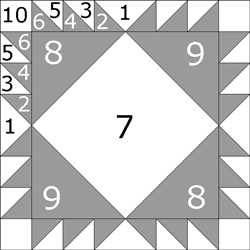 Sunshine design
Sunshine designSample Size: 8" finished / 8½" unfinished
Grid: 8x8
Attribution: Ladies Art Company
All of the measurements in the cutting chart below are for squares, i.e. 3-1/8" means to cut a patch 3-1/8" x 3-1/8".
As the patches get smaller, you'll probably want fabrics that read more like a solid—either tone-on-tone or low contrast fabric designs or actual solid fabrics.
In person, the sample block doesn't look quite as busy as it looks in the photos.
The center square for the 8" block is large enough for a 4" machine embroidery design as long as it looks good set on-point.
Don't forget to subcut #1-#6, #8 and #9.
 |
Cutting Chart for a~ Paperpiecing ~ | ||||
|---|---|---|---|---|---|
| Patch | Fabric | Qty | Sub Cut |
Finished Block Size | |
| 6” | 8” | ||||
| 1 | Background | 1 | | 3-1/8” | 3-5/8” |
| 2, 4, 6 | A | 12 | | 2-1/8” | 2-3/8” |
| 3, 5 | Background | 8 | | 2-1/8” | 2-3/8” |
| 7 | Background | 1 | na | 3-5/8” | 4-3/4” |
| 8, 9 | A | 2 | | 3-5/8” | 4-3/8” |
| 10 | Background | 4 | na | 1-1/4” | 1-1/2” |
| Unfinished Block Size | na | 6-1/2” | 8-1/2” | ||
| Grid Size | na | 3/4” | 1” | ||
No, your eyes aren't fooling you. The #7 and #8/#9 patches for the 6" finished block are cut the same size.
Step 3: Assemble the units for a Sunshine quilt block
General Sewing Machine Setup for Paperpiecing
- Reduce your stitch length to 16–20 stitches per inch (1.3-1.6 mm). This perforates the paper and stabilizes the seam when you remove the pattern. [Learn more about stitch length here.]
- Reduce your machine's speed or just plain slow down. Sew only as fast as you can stay on the stitching lines.
- Install an open toe appliqué foot (sometimes called an 'embroidery' or 'satin stitch' foot) if you have one (it's easier to see where you're stitching with one installed).
- Use a larger needle (90/14) if you have problems removing the pattern.
- If your machine has a needle stop up, use it. The stitching goes faster when you don't have to lift the presser foot with every seam.
- As you stitch each seam, start and stop a generous 1/4” before and after the solid stitching lines. ALWAYS. Future lines of stitching secure the ends.
After adding each patch, press the unit as it was sewn to set the seam and then open. The SA is automatically pressed towards the last patch added.
Before adding the next patch, take a look to make sure the one you just added covers the space plus seam allowance that it is supposed to.
Steam is optional and usually curls the pattern.
If that bothers you, don't use steam. Sometimes I do. Sometimes I don't.
It truly depends on my mood.
Remember, as you follow this paper piecing tutorial, the printed and the fabric sides of this block are mirror-images of each other.
At last!
Let's sew!
Sides

Make 4
Stick a #1, backside of fabric to unprinted side of pattern, with a dab of Elmer's Washable Glue Stick.
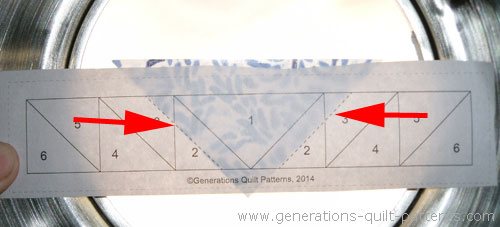 Use the dashed guidelines for easy positioning (arrows).
Use the dashed guidelines for easy positioning (arrows).With RST, position the long edge of #2 even with either the left or right side of #1 (it doesn't make any difference which is stitched first.)

Stitch on the line between #1 and #2, starting and stopping past the outside dashed line (see arrows).
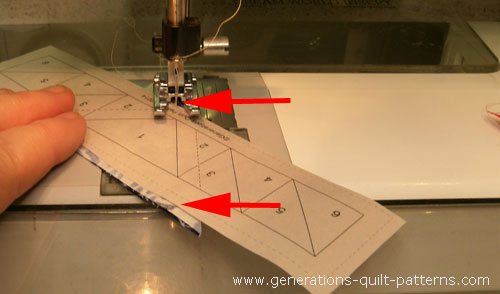
Trim the SAs to 1/4" either with your scissors or with your rotary cutter.

With RST, position a short edge of a #3 with the trimmed edge of a #2. For easy placement align the other short side of #3 with the #1 patch. (see arrows)

Continue in the same manner: positioning, sewing and trimming for the remaining #3-#6 patches. After the sewing is complete this is what a side unit looks like (below).
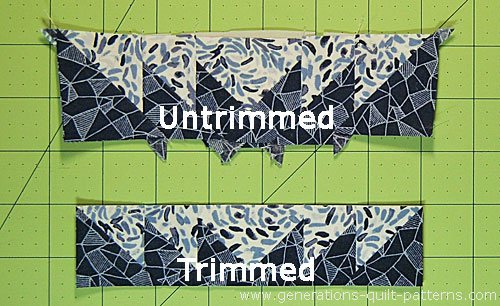
Repeat for all four side units.
To trim them to size, lay the 1/4" mark on your ruler directly over the solid outline that surrounds the block. Trim. Repeat for the three remaining sides.
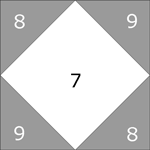
Center
Make 1
Use a dab of gluestick to adhere the #7 square to the unprinted side of the paper between the guidelines.
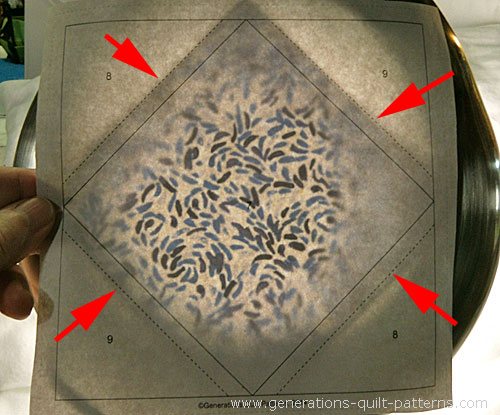
With RST, position a #8 on the #7. Line up the point of the patch with the corner of the unit. (see arrow)
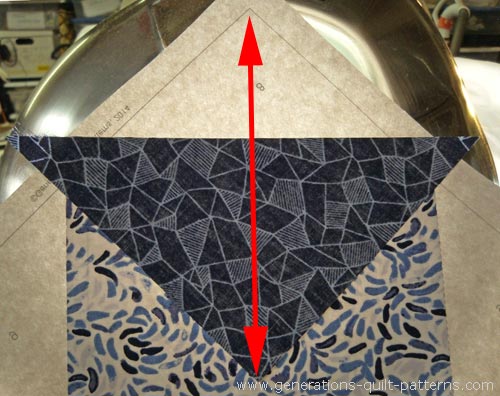
Stitch, starting and stopping a 1/4" from the ends of the solid line between #7 and #8. Repeat for the opposite #8. Press.

With RST, add the #9s in the same manner. After stitching, trim away the dog ears to reduce bulk.
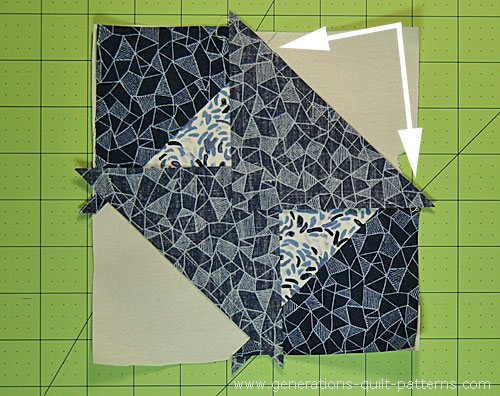 White arrows point to the two dog ears that were trimmed away. Trim all.
White arrows point to the two dog ears that were trimmed away. Trim all.Press and trim the unit to size.
Position the 1/4" mark on your ruler directly over the solid outline that surrounds the block. Trim. Repeat for the three remaining sides.
Remove all the paper from all the paper pieced units.

The paper piecing is complete. From this point forward, return your stitch length to the one you regularly use for piecing and install your favorite 1/4" presser foot.
Step 4: Assemble the Sunshine quilt block
Arrange the units into rows. All the points are at the outside edges of the block.
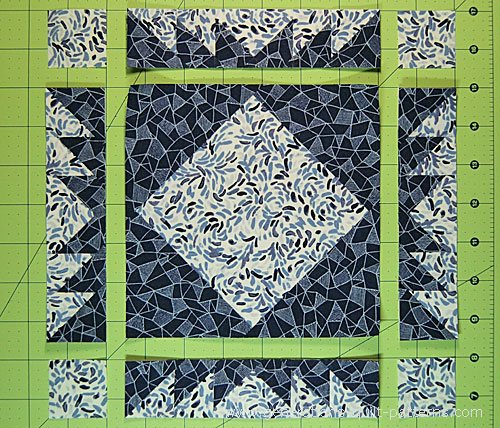
With RST, stitch the units in each row together.
To help encourage a good match at the points in the center of each side, I use pins. Insert a pin through the wrong side of the side unit at the very bottom of the 'V'(right arrow). Insert the pin through the right side of the center, again at the very bottom of the 'V' (left arrow).
Pull the units together and pin on both sides of this 'matching pin', pinning the rest of the seam as you normally would.
For more detailed information on this pinning technique see Perfect Points for Impeccable Patchwork.
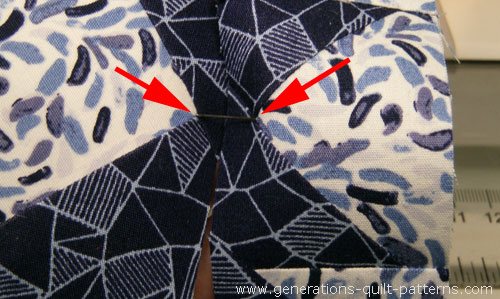 My pin came out at the point (left arrow) and went back in at the point (right arrow).
My pin came out at the point (left arrow) and went back in at the point (right arrow).After stitching, SA are pressed away from the bulkier side units.

With RST, stitch the rows together.
If your Sunshine block is a bit lumpy. Try my favorite pressing technique for exquisitely flat quilt blocks. You'll be amazed at just how simple it is!
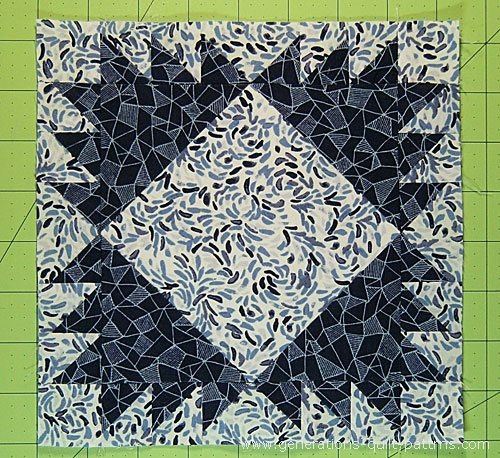
Our Sunshine quilt block is finished!
What about a different quilt block?
For a list of all the 220+ quilt block patterns on this site, start here.
If you know the name of the block, shorten your search by using these links:
Click here if you're looking for blocks with at least some paper piecing.
Click here if you're looking for the basic building blocks of quilting, i.e., Flying Geese, half square triangles, quarter square triangles, etc., along with several techniques to make each.
And finally, use these links to find blocks in these finished sizes:
For even more blocks to make...
For you, are quilt block designs like potato chips...
...you can't have just one?!!
Check the amazing resources I rely on for all the quilt block designs you see on this website.
To see if they're worthy of a spot in YOUR quilting library, CLICK HERE.
